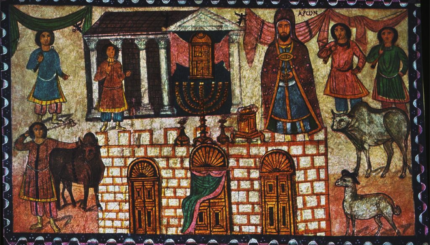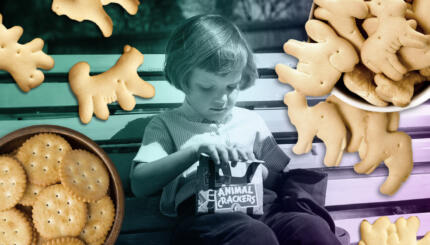My grandmother, Hannah Bahar, was a yevamah. My grandfather, Sallah Bahar, was a yavam.
The Barren One
My grandmother was born in Baghdad around 1908. Her parents were Hacham Ya’akov and Rahel Gubbay. She was one of ten children. When my grandmother was only seven, her father passed away. A year later her family moved to Bombay, India. She went to school in Bombay until the age of seventeen. My grandfather was born in Baghdad in 1905. His parents were Yehezkel and Chatoon Bahar. He was one of eight children. He had three older brothers: Gurgi, Abdula, and Shaul. His family also moved to Bombay.
At the age of seventeen, Hannah Gubbay married Gurgi Bahar. Tragically, the marriage did not last long. After less than two years of marriage, Gurgi died. There were no children. This brought great shame to Hannah, who was known as “the barren one.”
The Commandment of Yibbum
As Jewish law dictates, when a married man dies without children, one of the brothers of the deceased is obligated to take the wife of his brother as his wife. This is called the mitzvah of yibbum. If none of the brothers chooses to marry the deceased brother’s wife, she must be freed to marry other men through the process called halitza. In Ashkenazi circles it became the practice to prefer or even only to permit halitza because of the concern that the involved parties might not be capable of fulfilling the mitzvah with the proper intentions (see discussion in the Shulhan Arukh Even Ha’ezer 168:1).
With your help, My Jewish Learning can provide endless opportunities for learning, connection and discovery.
However, Sephardic or Edot Mizrah circles had a different practice, adhering to the original Torah law of preferring yibbum, and this was so in Hannah’s case. “Granny,” as many of her grandchildren lovingly called her, later related that her family did not even entertain the possibility of doing halitza because it would have been a big embarrassment.
Gurgi’s brother Abdula was willing to take Hannah as his wife, but he already had one wife, and Hannah, with the support of her mother Rahel, was not interested in being anyone’s second wife. However, one of Gurgi’s other brothers, Sallah, was unmarried, and he too was prepared to take Hannah as his wife. To this Hannah agreed. And so in 1926, Sallah performed the mitzvah of yibbum by taking Hannah, his deceased brother’s wife, to be his yevamah and wife. At the end of 1927 Hannah, previously known as “the barren one,” gave birth to a son.
Naming The First Born Son
Though it seems that the Torah obligates the yavam and the yevamah to name the first son after the deceased brother (see Deuteronomy 25:6), according to the rabbinic interpretation no such obligation exists and this is codified in the Shulhan Arukh (Even Ha’ezer 166:5).
Nonetheless, Hannah and Sallah’s first-born son was named Gurgi (Victor) for Sallah’s deceased brother, Hannah’s deceased husband. Over the years Hannah and Sallah added Jack, Yehezkel, Nissim, Shirley, Elaine (my mother), Isaac, David, Rochelle, and Immanuel to the family: ten children in all–seven boys and three girls.
In Tefillat Shaharit in the Siddur of Edot Mizrah the prayer are prefaced by (among other things) Tefillat Hannah— Hannah’s prayer. The biblical Hannah had no children and prayed very devoutly until God gave her a son, whom she returned to God to serve in the Mishkan. This son grew up to be Shmuel Hanavi–the prophet Samuel. Hannah’s intense prayers to God for a child and her vow to God that the child born will be given over to God’s service are recorded in the Book of Samuel (Samuel I, 1:10-11). Tefillat Hannah (Samuel I, 2:1-10) is the thanksgiving prayer she recited after she gave birth to Shmuel.
A Narrative from the Past
In Samuel I 2:5, Hannah says, ”She who was barren gave birth to seven,” and the Sages interpret this verse as referring to Hannah (see Yalkut Shimoni Shmuel 89), although it actually seems to contradict Samue l I 2:21. Hannah Bahar identified completely with the biblical Hannah and always recited Tefillat Hannah with great devotion. She saw herself as “the barren one” like the biblical figure, and she too had then given birth to seven; that is, to seven sons.
In 1968 Hannah lost Sallah, her second husband and the father of her ten children. The following year she left Bombay and moved to Toronto where she lived out her remaining years close to several of her children. There she wrote very special poetry that highlighted her close relationship to God throughout her life ordeals: losing her father at a young age, losing her first husband, and then losing her second husband. Remarkably, despite the odd and unfortunate circumstances of their marriage, Hannah loved Sallah dearly as she expressed in the following poem:
My Feeling for My Beloved
Even though you are gone,
I see you everywhere,
Face to face,
I can hear you join me in my laughter;
Once I felt your palm inside my palm,
To push me, alone, gleefully on my travels.
Would God you were with me,
My life would have been richer!
With a stronger heart I would have braved
a thousand taunts,
But you by my side, no one would dare
And if they did, who would care?
I miss you by night
I miss you by day
I miss you all the while
I miss you even when I say my prayers,
In sadness and in happiness I miss you my dear.
Hannah Bahar passed away on the 17th day of Tammuz in 5752 (1992). Her legacy is her children, grandchildren, great-grandchildren and the close relationship with God that she nurtured through her prayers and poetry.
Reprinted with permission from JOFA, the Jewish Orthodox Feminist Alliance.
mitzvah
Pronounced: MITZ-vuh or meetz-VAH, Origin: Hebrew, commandment, also used to mean good deed.
Torah
Pronunced: TORE-uh, Origin: Hebrew, the Five Books of Moses.


